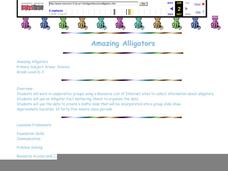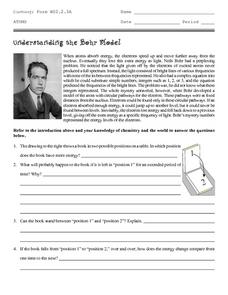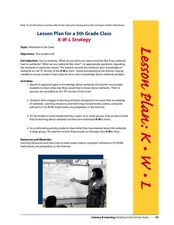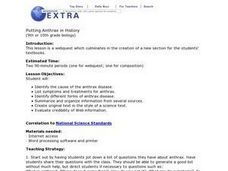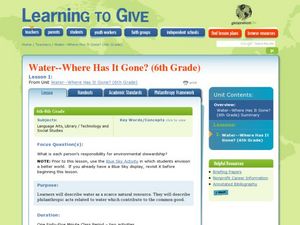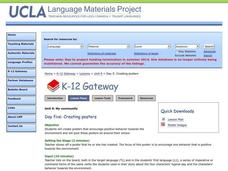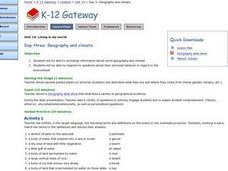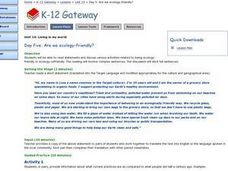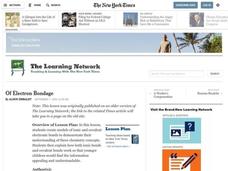Curated OER
Elementary Circuits
In this electrical circuits learning exercise, students answer 12 questions about basic circuits including identifying parts of a circuit, answering questions about shorted circuits and determining if voltage would exist at certain test...
Curated OER
Amazing Alligators
Students uncover facts about the alligator: including but not limited to habitat, characteristics, food, traits, habits, offspring and interesting facts.
Curated OER
Understanding the Bohr Model
For this Bohr model worksheet, high schoolers read about Neils Bohr and the model he proposed of the atom. Students answer nine questions about his theory that electrons travel in orbitals and give off energy when they are excited.
Curated OER
The Life Cycle of the Butterfly
First graders, after listening to fictional and non-fictional literature about caterpillars, and observing caterpillars from egg to butterfly, write a "biography" of a caterpillar using appropriate vocabulary and time lines.
Curated OER
The Solar System
Students examine effects of the sun on the planets in our solar system.
Curated OER
The Spanish Omelet
Students use analogies to show the relationships among cell, nucleus, genes, chromosome, ribosome, replication, mitosis, transcription, translation, DNA, RNA, amino acids and proteins, genotype, phenotype, and genetics vs. environmental...
Curated OER
Wetlands in Our State
Fifth graders access prior knowledge to create a KWL about the wetlands. In this wetlands lesson, 5th graders research to answer the questions in their KWL.
Curated OER
A Year (a Day or a Week) In My Life as a Shorebird
Learners describe the basic life history of one shorebird common to their area. They use the writing process which includes brainstorming, rough draft writing, peer editing, and re-writing to create a factually and grammatically...
Curated OER
Kingdom on Fungi
Students explore various types and characteristics of fungi. In this fungi instructional activity,students view drawings of how mushrooms grow, examine samples of fungi and complete a handout.
Curated OER
Putting Anthrax in History
Students identify the cause and symptoms for anthrax. They research information and summarize it into organized ideas. They evaluate the credability of websites as well.
Curated OER
Life Cycle: Diversity in a Balance
In this life cycle workbook, 3rd graders complete several different activities in which they analyze different invertebrates, identify arthropods, examine human biology and plants, and study natural environments. 20 different activities...
Curated OER
Your Land, My Land, Woody's Land Too
Students become familiar with the song writer Woody Guthrie and his song, This Land Is Your Land. In this getting to know our land lesson, students understand the vocabulary of the song and some biographical information about Woody...
Curated OER
Water--Where Has It Gone?: Earth Day
Students explore the concept of philanthropy. For this environmental stewardship lesson, students consider the plight of water as they consider water use and distribution. Students listen to an excerpt from The Well and consider...
Curated OER
Introduction to Spiders
Students discover various facts about spiders including different species, body parts, and types of webs. In this insect biology instructional activity, students begin a K-W-L chart about spiders, are read I Love Spiders by John Parker...
Curated OER
Animals and Humans Say the Darnedest Things
Students explore and analyze human and animal communications and create a short film that illustrates their findings.
Curated OER
Going the Distance
Students experiment in small groups to answer the question, "Is there a relationship between ramps and speed?" They apply a formula to calculate the speed of the cars used in the experiment, complete the associate lab report, and...
Curated OER
The Magic School Bus Holiday Special
Students learn along with Ms. Frizzle's class. In this Magic School Bus lesson plan, students learn the importance of recycling as they explore how things can be reused or recycled again and again.
Curated OER
Archaeology and Storytelling
Young scholars identify and interpret both individual families and whole cultures learn about their pasts by collecting and analyzing stories and artifacts. Then they identify that not all archaeological finds readily reveal their...
Curated OER
Levels of Classification
Students use diagrams to compare structural differences that taxonomists use to classify animals. For this classification lesson plan, students compare structures of different species from given diagrams. In one diagram they identify the...
Curated OER
Creating Posters
Students design original posters that encourage good attitudes towards the environment. In this positive environment activity, students brainstorm and create a list of positive behaviors for a good environment. Students create posters...
Curated OER
Geography and Climate
Students investigate geographical locations and their own personal experiences with the environment. In this environmental identification lesson, students participate in a match game using certain environmental and geographical terms...
Curated OER
Are We Ecology-Friendly?
Young scholars explore ecology. In this ecology lesson, students read scenarios, discuss them in groups and decide if they are eco-friendly or not. Young scholars discuss the differences in eco-friendly practices fifty years ago and now....
Curated OER
Ecology Lessons
Students examine the relationship between animal adaptations, habitats and community interactions. In this ecology instructional activity students complete a skull detective worksheet then use their knowledge to analyze a skull.
Curated OER
Of Electron Bondage
Students create models of ionic and covalent electronic bonds to demonstrate their understanding of these chemistry concepts. They explain how both ionic bonds and covalent bonds work so that younger students can understand.



